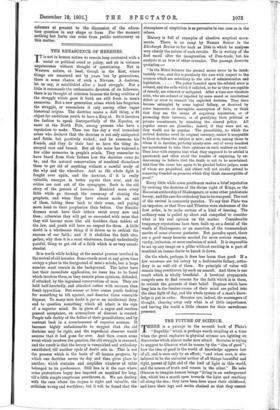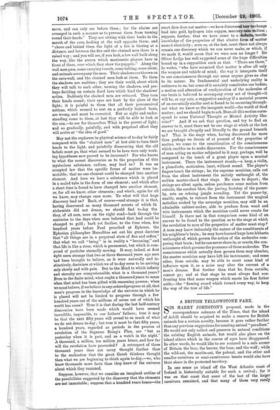THE FUTURE OF SCIENCE.
THERE is a passage in the seventh book of Plato's
" Republic " which is perhaps worth recalling at a time when the great explorers in physical science are lighting on discoveries which almost make men afraid. Socrates is tryiug to suggest to Glaucon what he means by the " idea of good "; how the idea of good in the world of knowledge appears -last of all, and is seen only by an effort; "and when seen, is also inferred to be the universal author of all things beautiful- and right, parent of light and of the lord of light in this, world, and the source of truth and reason in the other." He-asks Glancon to imagine human beings." living in an underground den, which has a mouth open towards the light and reaching all along the den ; they have been here since their childhood, and have their legs and necks chained so that they cannot
move, and can only see before them ; for the chains are arranged in such a manner as to prevent them from turning
round their heads." They are sitting with their backs to the mouth of the cave, looking at the wall opposite them; and " above and behind them the light of a fire is blazing at a .distance, and between the fire and the chained men there is a raised way ; and you will see, if you look, a low wall built along the way, like the screen which marionette players have in front of them, over which they show the puppets." • Along the mall men pass, some carrying vessels, some talking, some silent, and animals accompany the men. Their shadows are thrown on the cave-wall, and the chained men look at them. To them the shadows are realities ; they are their world, about which they will talk to each other, naming the shadows, and per- haps deciding on certain fixed laws which bind the shadows' action. Suddenly the chained men are released. They turn their heads round; their eyes are hurt by the glare of the light; it is painful to them that all their preconceived notions, which seemed to rest on a perfectly logical basis, are wrong, and must be corrected. But as sight and under- standing come to them, at last they will be able to look at the sun,—to see for themselves What is the parent of light; and so gradually, painfully, and with perpetual effort they will arrive at " the idea of good."
May not the explorers in physical science of to-day be fairly compared with the "chained men" at last able to turn their heads to the light, and painfully discovering that the old beliefs must go, that what seemed to be laws were only work- ing hypotheses now proved to be incorrect? For who knows to what the recent discoveries as to the properties of this mysterious substance, radium, may lead us ? It was an accepted law that the specific forms of matter were im- mutable; that no one element could be changed into another element. And here we have a substance which is placed in a sealed tube in the form of one element; and which after a short time is found to have changed into another element, or, for all we know, other elements; and which, again for all we know, may change once more. To what will that huge discoveip lead us? Back, of course—and strange it is that, having discovered so many thousand secrets of which th alchemists did not dream, we should find to-day tha they, of all men, were on the right road—back through the centuries to the days when men believed that lead could be changed to gold ; back yet further, to the time when, five hundred years before Paul preached at Ephesus, the Ephesian philosopher Heraclittis set out his great doctrine that " all things are in a perpetual state of flux and reflux," that what we call " being " is in reality a "becoming," and that life is like a river, which is permanent, but which is com- posed of particles eternally moving. It may, indeed, at first sight seem strange that two or three thousand years ago men had been brought to believe, as it were naturally and in- stinctively, doctrines at which we of to-day seem to be arriving only slowly and with pain. But to the Mind to which infinity and eternity are comprehensible, what is a thousand years P Even to the finite mind, what ought a thousand years to mean when that mind has been gifted with reasoning powers; when we mustbelieve, if we believe in anyordered progress at all, that man's progress in the knowledge of the universe in which he is placed will not be limited to progress through a few hundred years out of the millions of aeons out of which his world has come? True it is that during the last half-century discoveries have been made which would have seemed incredible, impossible, to our fathers' fathers; true it may be that the next fifty years will reveal to us much of what we do-not dream to-day; but true it must be that fifty years, a hundred years, regarded as periods in the process of revelation of the Supreme Being's Plan, are " but as yesterday when it is past, and as a watch in the night." A thousand, a million, ten million years hence, and how far will the revelation have proceeded ? A retrospect of three thousand years does not carry thought further than to the realisation that the great Greek thinkers thought then what we are beginning to think again to-day,—we, who know thousands more facts than they knew of the universe about which they reasoned.
Suppose, however, that we consider an imagined outline of the possibilities suggested by the discovery that the elements are not immutable ; suppose that a hundred years hence—the
exact date does not matter—we have discovered how to change lead into gold, hydrogen into oxygen, mercury into radium ; suppose, further, that we have come to a definite, terrific knowledge of the properties of that elusive form of matter named electricity ; even so, at the last, must there not always remain one discovery which we can never make, or which, if we made it, would mean that we were men no longer ? Sir Oliver Lodge has well suggested some of the huge difficulties bound up in a supposition such as that. " There are those,"
he writes, "who have surmised that matter is after all only the weapon and vehicle of mind; the way it interprets itself to our consciousness through our sense organs gives no clue to its nature. Its fundamental and underlying reality is unknown to us, but some of it certainly constitutes our bodies; a motion and alteration of configuration of the molecules a our brain is believed to accompany every act of thought—it
will be, at any rate, a suggestive analogy if a material process of an essentially similar sort is found to be occurring through- out what we know as the inorganic world—the world of dead matter ; and we should begin to ask, Does all this motion corre- spond to some Uuiveral Thought or Mental Activity like= wise ?" And if we ask that question, and try to find an answer to it, must there not be one stage at which at the last we are brought abruptly and literally to the ground beneath us? That is the stage when, having discovered far more than perhaps we dream of at present of the properties of matter, we come to the consideration of the consciousness which enables us to make discoveries. For the consciousness of man acting on matter subjected to it may, perhaps, well be compared to the touch of a great player upon a musical instrument. There the instrument stands,—a harp, a violin, a pianoforte, motionless, inert, without sound. The player's fingers touch the strings; he, the supreme musician, calls out from the silent instrument the melody unthought of, the sudden master-chord that rings. He rises to depart ; the strings are silent again, unless perchance some motion from outside, the careless blow, the jarring footstep of the passer- by, sets an echoing jangle sounding. Yet the passer-by, unable, maybe, to extract from the instrument the magical melodies evoked by the sovereign musician, may still be an admirable cabinet-maker, able to produce from wood and wire instruments which the musician could never create for himself. Is there not in that comparison some kind of an answer to be found to the question as to the stage at which the revelation to man of the properties of matter must stop?
A man may know intimately the nature of the constituents of his neighbour's brain ; he may have learned huge laws hitherto unthought of, which govern the action of the molecules com- posing that brain ; bat he can never share in, or create, the con- sciousness which governs the processes of those molecules. The consciousness which actually does govern them may slumber, the master musician may have left his instrument; and some other, from outside, may be able to exert some kind of influence upon it, as a noise may alter the current of a man's dreams. But further than that he, from outside, cannot go ; and at that stage he must always find con- fronting him that same weapon which smote his first father aside,—the " flaming sword which turned every way, to keep the way of the tree of life."



















































 Previous page
Previous page